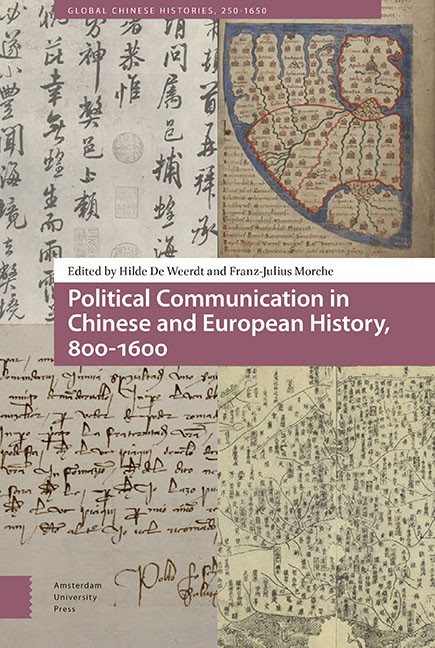Book contents
- Frontmatter
- Dedication
- Contents
- List of Figures and Tables by Chapter
- Acknowledgments
- Introduction
- Part I Communication and the Formation of Polities
- Part II Letters and Political Languages
- Part III Communication and Political Authority
- Part IV Memory and Political Imaginaries
- Epilogues
- List of Contributors
- Index
5 - Latin and Classical Chinese Epistolographic Communication in Comparative Perspective
Published online by Cambridge University Press: 17 June 2021
- Frontmatter
- Dedication
- Contents
- List of Figures and Tables by Chapter
- Acknowledgments
- Introduction
- Part I Communication and the Formation of Polities
- Part II Letters and Political Languages
- Part III Communication and Political Authority
- Part IV Memory and Political Imaginaries
- Epilogues
- List of Contributors
- Index
Summary
Abstract
A comparative history of the social and stylistic characteristics of letter-writing in the Western Latin world and in China has yet to be written. Among other difficulties, the historical study of letter-writing in China has only recently attracted scholarly attention, and the social and intellectual contexts of epistolary culture in China and the Latin West were in many respects strikingly different. This chapter compares, in a longue durée perspective, the differing assumptions that conditioned the development of epistolary genres in China and Europe, with a particular focus on the Song period (the period of ars dictaminis in Western letter-writing culture). It concludes by proposing a variety of potential methodological frames that could be fruitful in future comparative research.
Keywords: ars dictaminis, epistolography, epistolary culture (comparative), pragmatic writing, Song Dynasty
The idea of comparing European and Chinese traditional epistolary cultures is not new, even if so far it has led to few really relevant studies. There are many reasons for this relative neglect. The first one has already been pointed out and concerns the imbalance of secondary scholarship in the two fields. The study of letter and letter-writing has a longstanding tradition in the West and there has been a spectacular increase of interest in the subject during the last decades. Letters and letter-writing are notably associated with crucial moments of definition of the stylistic and cultural Latin tradition (Ciceronianism, the rise of the Christianism and theological debates in late antiquity, the structuration of the feudal world and of the medieval state, the birth and flourishing of Humanism, later the so-called ‘republic of letters’). Interestingly, letter-writing in the West suffered from a lack of theorization until quite late in this long history (later, one could paradoxically argue, than in China): one must await the end of the eleventh century to see the rise of the first relevant tradition of Latin letter-writing manuals. In spite of this, however, the letter was more often than not at the centre of redefinitions of proper style and communication, at times in a dialectical relationship with oratory. In Chinese history, by contrast, even if the practice of letter-writing was prominent since at least the end of antiquity, and clearly theorized by no later than the sixth century, the genre as such has not received consideration by modern scholars to the same degree.
- Type
- Chapter
- Information
- Publisher: Amsterdam University PressPrint publication year: 2021



